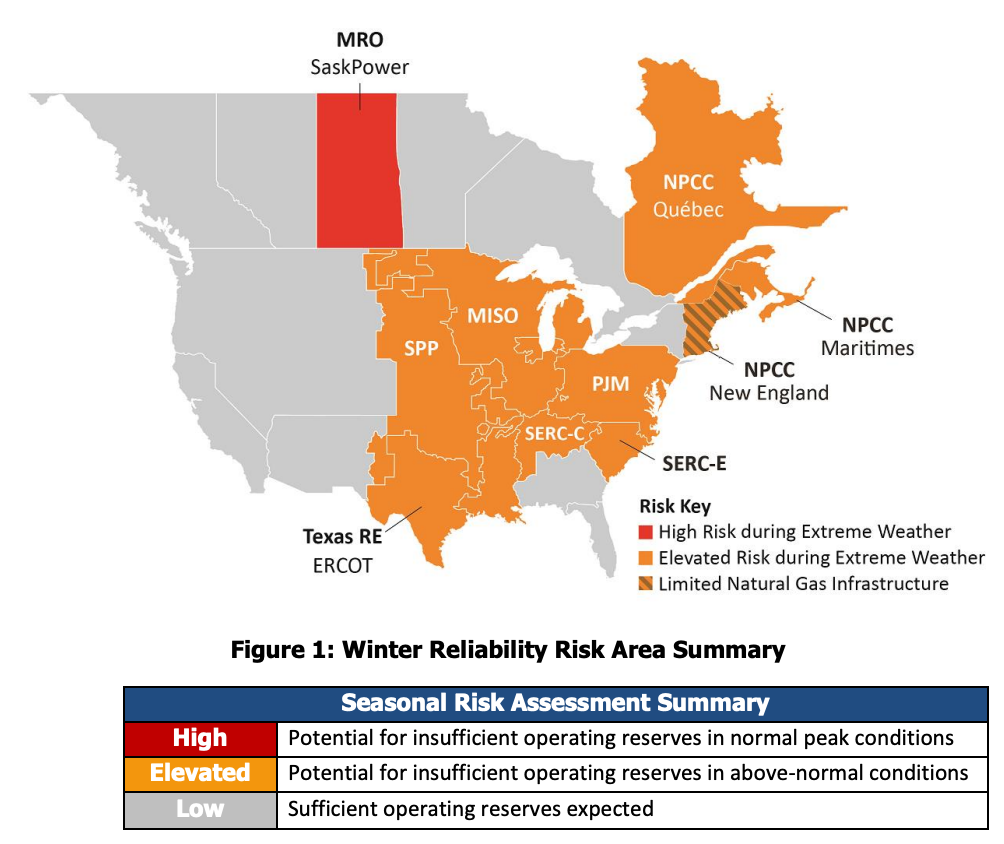According to the North American Electric Reliability Corporation (NERC)’s 2023-2024 Winter Reliability Assessment, two-thirds of the United States and Canada may be in for a chilly winter season. The report concludes that during peak winter weather conditions, prolonged dips in temperatures will significantly disrupt the electric grid and threaten the reliability of bulk power generation and electricity for millions of residents.

North American Electric Reliability Corporation (NERC) anticipates two-thirds of North America is at risk for power outages if severe weather hits this winter. Source: NERC 2023-2024 Winter Reliability Assessment
States across the American Midwest, Northeast, Mid-Atlantic, and South are at greatest risk for power disruption this winter. No matter the industry — from self-storage facilities to nonprofit organizations, agribusiness to construction and more — outages of this scale can severely hamper business continuity.
Who could forget Winter Storm Uri, which caught Texas and surrounding states by surprise in 2021, leaving nearly 10 million people without power? During the eight-day freeze, crisis conditions escalated quickly — water and sewage pipes burst, tap water was undrinkable, and fires broke out in buildings as people desperately tried to keep warm. All told, Uri claimed 246 lives and tallied up an estimated $15 billion in insured losses.
Ensuring Businesses Are Prepared for Winter Storms
Although each business has its unique risks and exposures when it comes to weather, here are seven tips that can jump-start your clients’ winter-preparedness efforts and ensure the safety of their businesses, employees, and customers this winter season.
1. Keep an eye on the weather and early warning alerts. Stay informed about approaching winter storms through weather-monitoring services and early-warning systems. These tools provide valuable information about the severity and timing of a storm, allowing businesses to take preemptive measures. While there are many options to monitor local and regional weather patterns, one easy way is through Wireless Emergency Alerts (WEA), a nationwide emergency system that sends text message alerts directly to your phone.
2. Winterize buildings and surrounding grounds. Prepare buildings and facilities for winter by thoroughly inspecting commercial properties now. Check that attics, walls, and basements are properly insulated to retain heat and minimize the risk of frozen and burst pipes. Remove overhanging tree branches that could potentially break under the weight of heavy snowfall or ice accumulation and cause property damage or injuries. During winter months, inspect property and buildings daily to identify and address potential hazards early. In freezing conditions, closely monitor sprinkler systems, HVAC, and water-filled equipment lines. Use heaters when possible to prevent freezing and allow water faucets to slightly drip to keep water flowing through the lines.
3. Create plans for winter storm emergencies and power outages. Winter storm plans for businesses should include procedures for communication, evacuation, and managing essential business functions. Assign roles and responsibilities to key employees so that everyone knows what to do in case of an emergency. Regularly review and update the plan to address any changes in personnel, equipment, or facilities.
4. Plan for both shelter-in-place and remote work scenarios. Winter storms can lead to transportation disruptions, which could either force employees to unexpectedly remain on the premises or make it unsafe for them to come into work. In case employees must weather the storm at their workplace, businesses should have a stockpile of essential items ready, such as bottled water, non-perishable food, batteries, flashlights, first aid supplies, and any necessary industry-specific materials. Businesses that are able to leverage remote-work capabilities during winter storms and outages should create a clearly worded remote-work policy and ensure that employees have the necessary tools and resources to work off-site securely.
5. Create a communications plan. Commercial operations should have a communication plan in place to ensure that employees, customers, vendors, and suppliers are informed of business interruptions, closures, and schedule changes via multiple channels (email, messaging apps, phone, social media, etc.)
6. Implement a snow-and-ice removal plan. Timely removal of snow and ice can prevent accidents and ensure that businesses remain open and operational. Operations should develop a plan to keep walkways, parking areas, and building entrances clear. In addition, snow accumulation should be cleared away from the foundation, basement windows, and downspouts to prevent leaks and water damage once the snow begins to melt. For businesses that outsource snow-and-ice removal to licensed and insured contractors, be sure that maintenance agreements are executed prior to the start of winter storm season.
7. Invest in backup power systems. Power outages can be particularly disruptive to business operations. Investing in backup power systems, like generators or uninterruptible power supply (UPS) units, can prevent equipment breakdown and ensure that critical systems remain operational during an outage. Be sure to regularly test and properly maintain all backup systems to guarantee their reliability when needed.
Insurance agents play a critical role in educating their clients about possible exposures, available coverage, and prudent risk-management planning. Don’t wait until the first snowfall arrives to reach out to your clients who own businesses to ensure that they are prepared for whatever winter may bring. It’s also an ideal opportunity to conduct a coverage review and discuss plans for the coming year. Business expansion, acquisitions, new construction, renovations, and adding lines of business all require modifications to the operation’s insurance coverage. An end-of-year coverage audit can help ensure that your clients have the coverage they need to face whatever happens in the new year.
Call in the Risk Management Specialists at MiniCo
Insurance coverage is an integral part of any business’s winter-preparedness plan. MiniCo’s dedicated program teams are experts when it comes to risk management, loss mitigation, and customizing insurance solutions for your clients. Our program underwriters and claims professionals are available to assist you in providing risk management resources and information to your clients. MiniCo’s diverse portfolio of exclusive programs includes a wide range of niche industries including self-storage operations, agribusiness, nonprofit and social services, and artisan contractors, and more.
Contact a MiniCo program expert for more information about our exclusive programs and learn how you can best protect your clients and their businesses during the winter season and year-round.




